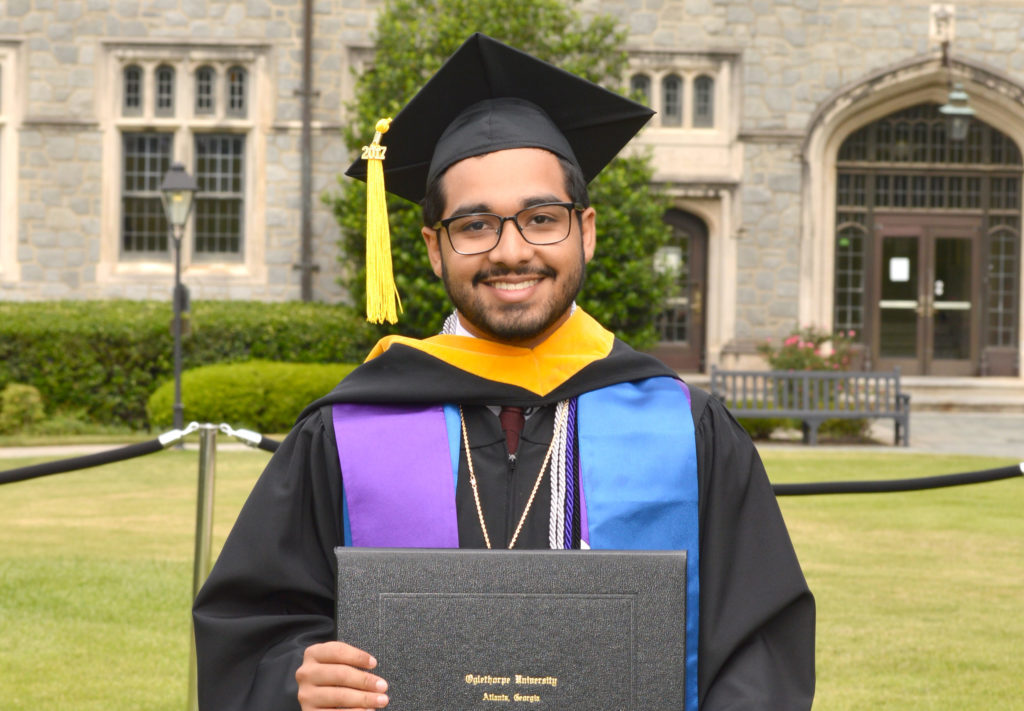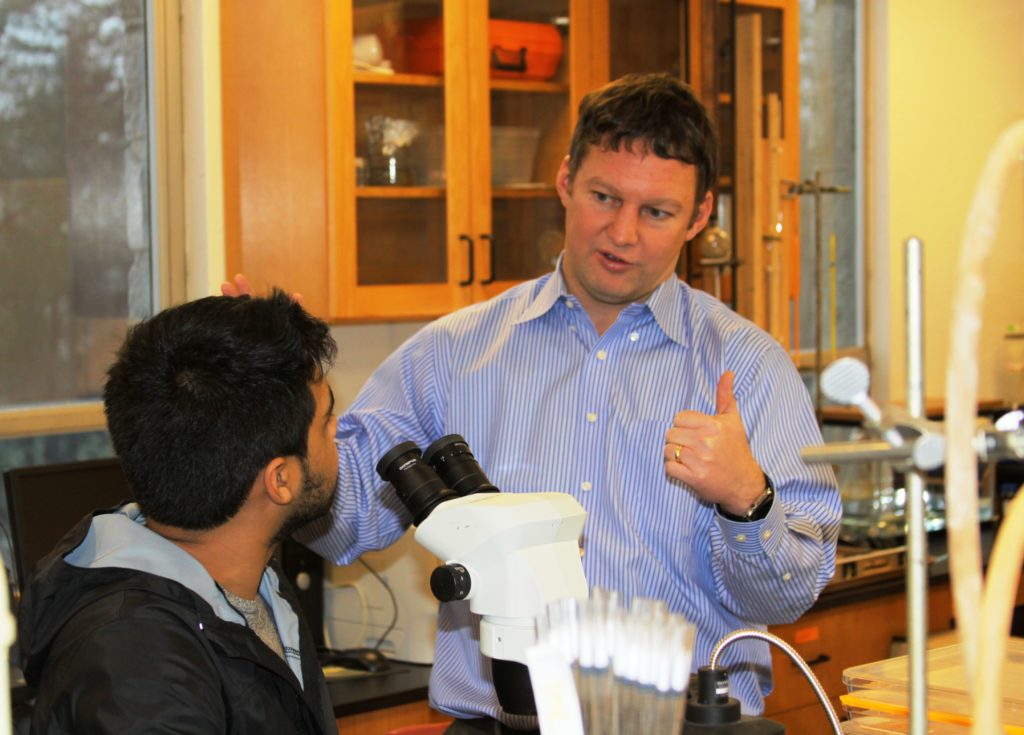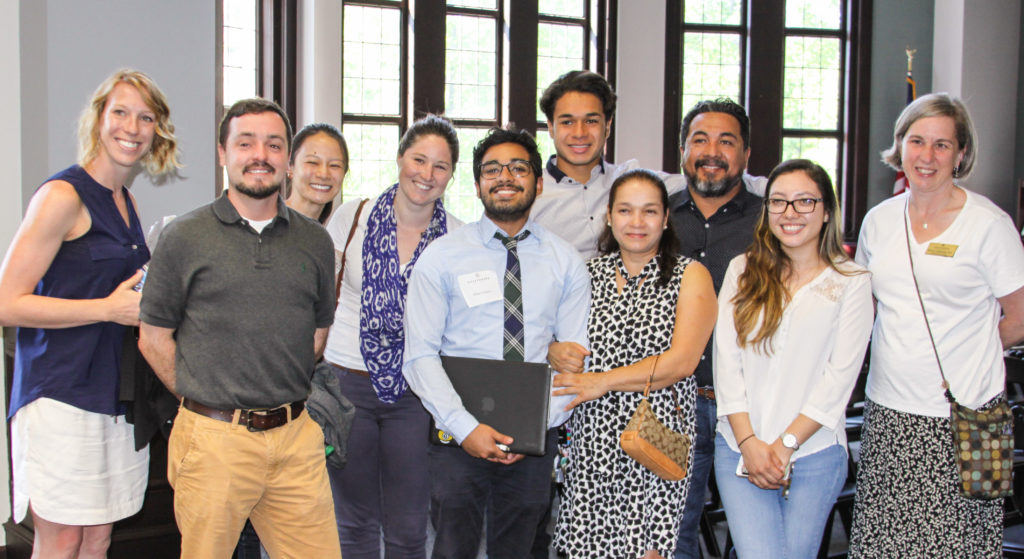How the partnership between Oglethorpe and Emory is opening doors for an ambitious biology student—and advancing research in epigenetics
The fast-growing field of epigenetics is one of the hottest topics in biology research. Exciting discoveries are emerging all the time. And now Elias Castro, a biology major and recent graduate of Oglethorpe University, has contributed to the field with a finding of his own. Through original research conducted for his Honors thesis, Castro uncovered new roles for two key genes.

Elias Castro ’17
We all know that genetic information is passed between generations via DNA. What scientists have discovered more recently is that changes in gene expression are passed between generations, too. These changes don’t involve alterations to the genetic code, but instead alterations to how the genes are packaged.
In other words, genetics decides whether you inherit certain traits—but epigenetics can decide whether or not those traits present themselves.
An individual’s epigenetic code can be influenced by a number of factors, including environment and lifestyle. It changes over a lifetime, and these changes can be passed onto offspring. It’s a fascinating topic with enormous implications for human health and wellness, and there’s still plenty to learn.
In Dr. David Katz’s lab at Emory University, researchers are working to uncover these secrets. As part of a larger undergraduate research collaboration between Emory and Oglethorpe, each semester the lab also hosts one or two students from Oglethorpe. Castro was one of these students. He was also one of the first Oglethorpe students to conduct original research for an Honors thesis in biology.
Castro’s mentor was Dr. Brandon Carpenter, a post-doc researcher in the Katz lab. Dr. Carpenter fell in love with teaching while he was completing his undergraduate and masters’ degrees at Appalachian State University. When he headed to the University of Michigan to complete his Ph.D. in Cell and Developmental Biology, he also obtained a teaching certificate and developed his knowledge of pedagogy.As Dr. Carpenter searched for his first job, his dream was a role in a biology lab where he could pursue hands-on research and also develop his skills in teaching and mentoring. His search led him to Emory University and the Katz lab.
Through Dr. Carpenter’s mentorship, Castro benefited from a level of guidance that most students only encounter in graduate programs. They met often, and kept in touch from day-to-day. Dr. Carpenter advised Castro on approaches to take in his research, coached him on analyzing the data he found, and pushed him to perfect his charts and graphs. Castro also presented in lab meetings and attended scientific events alongside Dr. Carpenter.
“Elias has really changed the way we’re thinking about how SPR-5 functions. We used to think it was simple. His experiments have really made it more complicated and interesting at the same time.”
The opportunity paid off. Castro made some very fascinating discoveries—with immediate relevance to Dr. Carpenter’s and Dr. Katz’s work.
Like other researchers in the Katz lab, Castro worked with C. elegans, a worm and model organism that’s very useful for conducting basic research. His project explored two particular genes, spr-5 and met-2, which play a role in deciding how epigenetic changes pass between generations.
Previously, the researchers believed these genes mainly functioned as determinants of how parental genetic material is passed on to the zygote. They believed spr-5 and met-2 exerted their effect only during fertilization, when the mother deposits these proteins into the egg. There, they function together to reprogram the progeny’s epigenetic landscape.
But Castro’s research revealed these genes have zygotic roles, too. They could also regulate gene transcription during the worm’s development. In other words, these genes aren’t just determining the inheritance; they’re also operating as the zygote develops into a worm, further influencing the offspring’s traits.
The research doesn’t just have implications for the lives of worms; it could also shed light on epigenetic heritability in humans, too.
“Elias has really changed the way we’re thinking about how SPR-5 functions,” Dr. Carpenter says. “We used to think it was simple. His experiments have really made it more complicated and interesting at the same time.”

Elias confers with Dr. David Katz
While Castro discovered intriguing knowledge about epigenetics, he also learned important lessons about patience and problem-solving. “My biggest lesson has been that I’m human; I’m not superman,” Castro says. As a pre-med student, Castro tends to approach school as a perfectionist. “You strive to be the best and do everything at 100 percent.” But scientific research doesn’t always work like that. Sometimes you have to take risks; sometimes you even learn the most from failure.
“I’ve learned that whatever happens, even if it’s a mistake, even if it’s your fault, it’s a learning experience. That’s how you grow.”
Dr. Carpenter learned a lot, too. “It’s helped me practice communicating the ideas and the project very clearly, and taught me what to expect at the undergrad level—how to start at the basics.” Dr. Carpenter wants to teach at an institution that emphasizes undergraduate education, so this experience is also helping him get closer to his goals.
Oglethorpe’s inquiry-based science curriculum played a huge role in making this successful collaboration possible. When Castro joined Dr. Katz’s lab, he already knew how to use C. elegans to create genetic crosses and gather data. “As soon as Elias came in, he could start working on his project,” Dr. Carpenter says. So Castro’s mentors could focus on helping him with the high-level stuff, like designing better experiments and presenting data more effectively.
“Oglethorpe students are very capable. They’re very confident going into a lab. At a lot of institutions, students coming out of undergrad can’t say that.”
While Castro may be a particularly talented student, he also attributes his success to his previous experiences with undergraduate research at Oglethorpe. “Oglethorpe students are very capable,” he says. “They’re very confident going into a lab. At a lot of institutions, students coming out of undergrad can’t say that.”
Castro successfully defended his honors thesis in May and graduated with the Oglethorpe class of 2017. Next, Castro plans to take a year to work as a laboratory technician and apply to medical school. Eventually he hopes to go into academic medicine, combining health research and patient care to advance the field.
With Castro’s lab experience at both Oglethorpe and Emory, he is already off to an excellent start.

Elias pictured with family, professors, and mentors following his Honors research presentation at the 2017 Liberal Arts and Sciences Symposium, a day-long forum of exemplary analytic and creative work and research produced by Oglethorpe students during the academic year.
